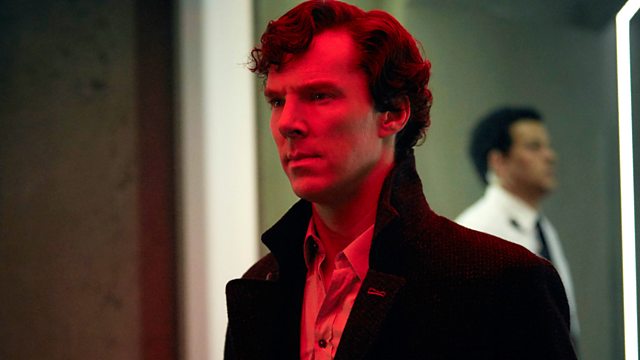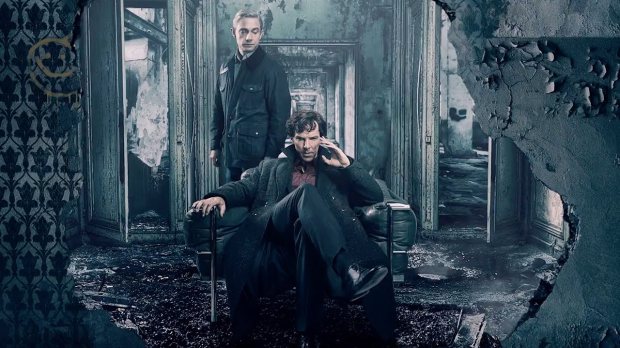(This post goes into great detail about spoilers. Look away if you haven’t seen it.)
Last week’s episode of Sherlock definitely ranks as one of the best. The singular crime was undoubtedly one of the creepiest, aided by Toby Jones’ sinister villain. The emotional core rocked throughout with steadied beats that pulled and pushed John and Sherlock’s relationship through new and murkier depths. Allowing the crime to unlock an undercurrent of sentiment, The Lying Detective was superb writing that brought back an atmosphere that The Six Thatcher‘s was missing.
What people enjoyed most was the reveal of Eurus – Sherlock’s secret sister who has been disguising herself to infiltrate 221B Baker Street. It was a twist hardly anyone saw coming, spending the past week on tenterhooks trying to figure out who exactly was she and what The Final Problem was.
And what it was, was woefully underwhelming.
The Final Problem kicks off with Sherlock trying to find out the truth about Eurus. With Mycroft’s sordid secret out in the open, the question was simple – who was this sister? Where was she being kept? And what devastation lies in the wake of her return? It’s up to Sherlock, John, and Mycroft to find out…
The episode, indeed, was rife with twists and turns, interesting segues, and impossible tasks that felt borrowed from films such as Saw or Mission Impossible. Whilst there are points of genuine suffering and the acting excavated a lot from Cumberbatch’s Sherlock, fundamentally it felt a little bit unrealistic and confounding.
Sherlock‘s main problem following the Reichenbach Fall was the lack of a truly imposing villain that bloomed as whispers, held a strong presence over six episodes, and culminated in arguably the show’s best episode of all time. Eurus was hastily built as Sherlock’s intellectual superior without any moral compass to distinguish between good and bad (as so explained by the woman herself.) As a child she was feared by Mycroft and her parents because she was so ruthless in her intellect and her reveal in The Lying Detective left our mouths gaped open.
In The Final Problem, it turns out she has been locked away in a high-facility but has miraculously escaped. Several times. Luring them into a trap, Eurus is keen to manipulate our boys with hard cases, emotive consequences, and a long-forgotten riddle that is the secret to Sherlock Holmes. Yet Eurus, a grown up Samara from The Ring type of psychotic prisoner who is almost superhuman in the way she can convince people to do her bidding, is wasted in this puzzle within a puzzle set-up. Though greatly acted by Sian Brooke, her presence never feels entirely realised and doesn’t cling to the air in the way that Moriarty’s did. To a point that, when Andrew Scott turns up in all (flashback) glory, you remember how great he was and was disappointed when the “Five Years Ago” sign appeared on screen. The East Wind blew a chill that ended up being more of a lazy draft: Her whole “thing” was deduced so quickly and she was reduced to a lost child (her mind palace was a girl in a crashing plane) so easily that the final ten minutes of the show felt false.

In allowing themselves to indulge in the high-concept of a rubix cube prison with crimes to be solved, the creators and writers, Mark Gatiss and Stephen Moffat, abandon and skirt over all sorts of logic in order to get there. The whole idea that Eurus could swan out of this supposed “hell on earth” sanitarium is good for one trip but Eurus has been flirting with Watson, taking walking trips with Sherlock (where somehow CCTV couldn’t see her,) and pretending to be a therapist for a very long time. Sure, she manipulated the Sherrinford staff to the point where she had them under her complete control but it seems like a lapse in Mycroft’s judgement to simply phone every now and then without popping by to uncover all the scheming. There is this air of almost Hollywood make believe: Where we have to trust, whole-heartedly, that incarcerated super-villain could pull this off within just five minutes of meeting Jim Moriarty (whose involvement was scurried away and only enjoyed through Andrew Scott’s undeniably brilliant recordings.) It just leaves a despondent feel in the air. Not to mention the twists in the Holmes’ path that can be only made plausible if the parents stopped mourning for Eurus to the point where they didn’t mention her (before you say it, yes, I’ve considered that they simply stopped talking about their dead daughter to protect Sherlock who’d written Eurus out of his entire history and this smarts with a lack of complete empathy.)
As fun and frivolous as this episode is, with a distinct adoration for the sociopath tendencies of Hannibal Lecter peppered throughout the 90 minutes, it ultimately feels like a horror film made for public streaming. The little riddles of Eurus’ are left with predictable and safe endings that loosen the reigns of tension The Final Problem so desperately needed for it to all come together and work. The lack of shock that was dutifully promised by the show-runners ruins the complete enjoyment of the show – with a complex villain plot solved by making our female villain just another woman vying for Sherlock’s attention.

Many will lament that this is the end of Sherlock: The speech recorded by Mary was an ode to the adventures of Sherlock and John as they both rebuild their lives with no shock twist to keep us on our tenterhooks certainly echoed of finality. Perhaps this should be where Sherlock leaves us, in a rounded place where the titular character’s glazier persona is unravelled to the point of a childhood trauma and he can move on with a much more human stance. The lack of complete punch, however, leaves a cheesy taste in ones mouth as one has to question – is this really the last story Sherlock has left to tell?

